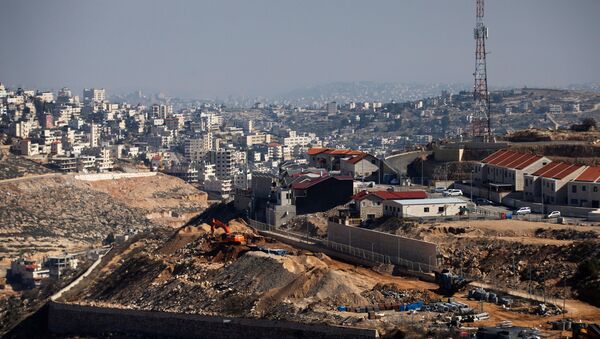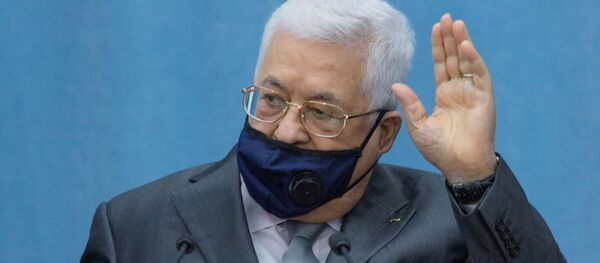The head of the Palestinian Authority (PA) Mahmoud Abbas has warned that Israel's plan to extend sovereignty over parts of the West Bank will lead to the cancellation of the 1993 Oslo Accords that saw the establishment of the PA and presupposed the creation of an independent Palestinian state with its capital in East Jerusalem.
Although similar threats have been voiced by Abbas before, Nidal Foqaha, Director General of the Palestinian Peace Coalition-Geneva Initiative in Ramallah, believes this time around the president is "dead serious" primarily because Israel's intention to chop off some 30 percent of the predominantly Palestinian West Bank is considered "an existential threat for the PA leadership".
"The plan will harm the territorial continuity of the West Bank and will leave the Palestinians with small and fragmented areas that will be tough to secure and manage", he says, adding that while the intention is there, Abbas will find it difficult to stick to his promises.
Endless Losses
One of the reasons for this, says the expert, is the large number of joint economic projects signed between the PA and Israel. Throughout the years, Tel Aviv and Ramallah have inked deals in a number of spheres including energy, cement, electricity, and telecommunications; and the cancellation of the Oslo Accords would put these and similar initiatives at risk.
But it will not stop there. Over the years, the two sides have also cooperated in terms of security, with the PA helping Israel thwart scores of terrorist attacks against its military and civilian targets. Although this coordination still continues despite earlier threats made by Abbas to stop any Palestinian assistance to Tel Aviv, the termination of the Oslo Accords will likely drive the final nail into the coffin of this security partnership.
"To be honest, Israel has never been bound by the Oslo agreement in the past but at least the pact was there on paper. Now, however, if it is cancelled, we will be forced to go back to the times of instability, insecurity, and violence and Israel will be the first loser from this situation", Foqaha believes.
In recent weeks, amid calls by Hamas to initiate a third Intifada, Palestinian militants have carried out several attacks against the Jewish state's military targets. Three weeks ago, an IDF soldier was killed near the West Bank city of Jenin after an assailant threw a rock at him, smashing his skull. Another incident occurred next to Hebron, when a Palestinian rammed his car into a soldier, causing him multiple injuries.
And Foqaha says that if Israel votes in favour of the bill to annex parts of the West Bank (set for early July), the situation will go from "bad to worse":
"From the political point of view, the dissolution of the PA will mean that the two-state solution is officially dead. Israel will need to enter the areas left by the PA to establish its military rule there, a move that will enhance its image as the region's occupying force and will bolster Palestinian resistance".
Apart from it creating a serious military burden for Israel, it would also mean that the Jewish state needs to accommodate Palestinians' economic and civilian needs, something that Tel Aviv might want to avoid at all costs.
Right now, the PA, which employs more than 170,000 people, takes care of most of the needs of the Palestinian population, providing them with everything from healthcare and education to development, relief and police services. The annulment of the accords is set to shift that responsibility away from Ramallah and straight onto Tel Aviv, tightening the noose around the neck of Israel's economy, which has been suffering from an acute economic crisis caused by the outbreak of coronavirus in mid-March.
No Cash, No Leadership – Abbas to Lose Too
Yet it is not only Israel that will lose, the Palestinian leadership is set to feel the pinch too. Since the establishment of the PA in 1993, Ramallah has received generous international donations that were aimed at improving the lives of ordinary Palestinians. Washington, for example, gave more than $6 billion, whereas the European Union as well as the Gulf states have poured in billions in economic and humanitarian aid.
The breaking down of the PA would put an end to these cash injections. But it would also terminate the rule of Abbas, potentially paving the way for radical forces seizing control of the West Bank.
Even before Israel voiced its plans to annex parts of the West Bank within US President Donald Trump's "deal of the century" peace plan, rolled out at the end of January, Palestinians expressed support for the two leaders and considered them potential successors to Abbas.
Last December, a poll conducted by the Palestinian Centre for Policy and Survey Research found that 61 percent of those asked wanted the president to resign, vacating the position to either Barghouti or Haniyeh and experts speculated that their popularity would only grow with time.
Another poll, conducted after the declarations made in Washington, revealed that 64 percent of Palestinians supported an armed struggle, a stark increase from a previous survey where 47 percent voiced similar views.
"The dissolution of the PA might make radical elements rear their heads; they might become more visible and more active, but they will not harm the Palestinian people. Their anger will be directed first and foremost against Israel so Tel Aviv should think twice before it votes in favour of the annexation and harms the status of the Palestinian Authority", Foqaha sums up.



